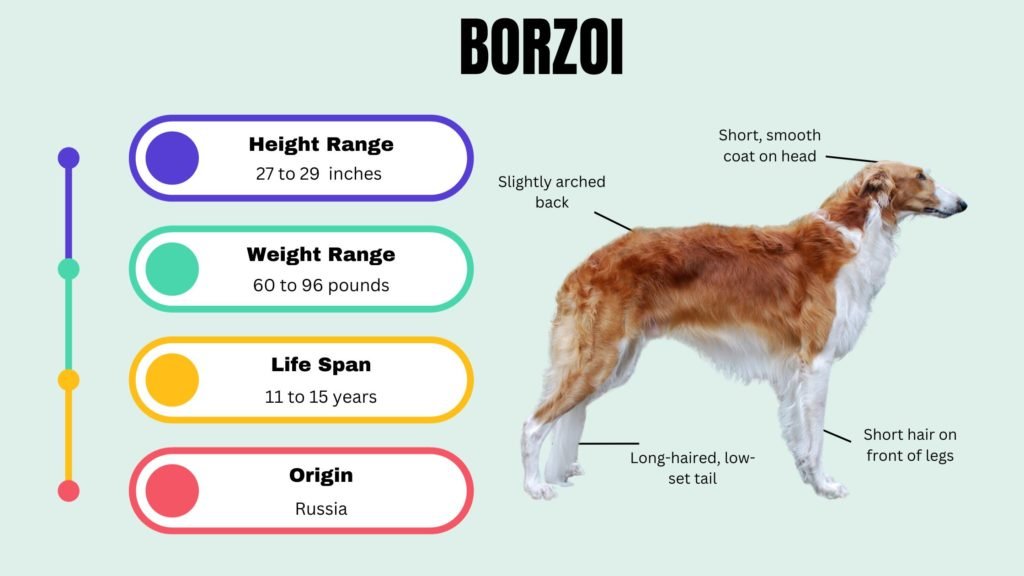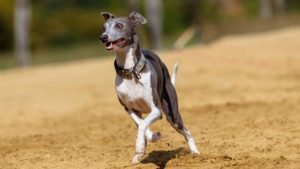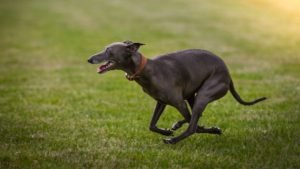Borzoi History
The Borzoi has a captivating history dating back to the 1600s in Russia. Initially bred to serve Russian nobility, this majestic hound was designed to hunt wolves and other game in the expansive terrains of the Russian wilderness. Its inception involved a combination of different breeds, such as the Arabian Greyhound and native Russian dogs, creating a perfect blend of speed, agility, and power. During the Tsarist rule, Borzois became a status symbol, gracing the grand palaces and in opulent hunting events that were social fixtures for the Russian elite.
After the Russian Revolution, the breed faced a dark period. Many Borzois were killed due to their association with the aristocracy, almost driving them to extinction. Fortunately, a few survived, and dedicated breeders worked tirelessly to bring them back. Their efforts were fruitful, and by the mid-20th century, the Borzoi had gained popularity in Western countries like the United States and the United Kingdom, primarily as a show dog and a luxurious companion animal rather than a hunter.

Borzoi Characteristics
The Borzoi’s characteristics are as majestic as its history. Standing often at 30 inches or more at the shoulder for males, this breed combines size and grace like no other. Their elongated, narrow heads, deep chests, and long legs give them an almost ethereal presence. These physical traits are functional, too, enabling the Borzoi to reach speeds of up to 40 miles per hour.
This beauty, however, comes with its set of health challenges. The breed is susceptible to Gastric Dilatation Volvulus (bloat), a life-threatening condition common in large, deep-chested dogs. Moreover, they are also at risk for Progressive Retinal Atrophy (PRA), which can lead to blindness. The Borzoi’s slender frame also means they have less fat to metabolize anesthesia, which makes them particularly sensitive to drugs. Responsible ownership involves being aware of these vulnerabilities to offer specialized medical care when required.
Borzoi Personality
Regarding personality, the Borzoi is often described as a dog of dichotomies. Despite its imposing size, it is exceptionally gentle and usually gets along well with families and other pets. The breed is known for its calm, almost cat-like demeanor at home. However, once outdoors and given a chance to run, they transform into incredibly agile and energetic dogs, thanks to their sighthound lineage.
Training a Borzoi presents its unique set of challenges. They are intelligent but have a strong independent streak. They get bored quickly, so conventional training methods often need to work better with them. Short, engaging, and fun training sessions combined with lots of positive reinforcement are the keys to training a Borzoi successfully.
While they may not be the best breed for first-time dog owners due to their specialized needs and independent personality, the reward is a loyal, elegant, and affectionate companion for those who understand these beautiful animals.
Borzoi Life Span
The Borzoi has a life expectancy of around 9 to 14 years. However, this isn’t a guarantee, as the dog’s life span can be significantly affected by its health and care. Regular veterinary visits for routine check-ups, vaccinations, and preventative medicines can dramatically extend Borzoi’s life. Given their susceptibility to specific genetic conditions like bloat and Progressive Retinal Atrophy, early detection and treatment can add quality years to their life. Responsible ownership, a proper diet, and regular exercise also contribute to their longevity.
Borzoi Family Life
Borzois make excellent family pets but come with certain caveats. Their size and calm demeanor make them suitable for families with older children who understand how to interact with dogs respectfully. Borzois love to be around their human companions and are loyal to their families, often forming close bonds with one or two individuals in the household. While they aren’t overly affectionate or needy, they appreciate the comfort of a loving home and are happiest when included in daily family activities. Although they’re generally not the best choice for families with young children, they can thrive in a home where everyone understands and respects their unique needs and personality.
Borzoi Habitat and Diet
Borzois are adaptable when it comes to their living environment. They’re content in rural and urban settings, provided they get enough exercise and mental stimulation. If you live in an apartment, make sure there’s enough room for them to move around comfortably, and consider their ability to climb stairs, especially as they age or if they become ill.
Their diet must be as memorable as they are, especially since they’re prone to bloat. Feeding them smaller meals more frequently can help mitigate this risk. A balanced diet rich in protein and low in fillers is ideal. Please consult your vet to determine the appropriate diet plan for their age, weight, and activity level.
Borzoi Temperament
Borzois are generally calm, intelligent, and independent dogs. They are not overly excitable or anxious, making them excellent companions for people who prefer a more subdued pet. Don’t mistake their calmness for aloofness; Borzois are perceptive and can form strong emotional bonds with their human companions. They might not jump up and down when you walk through the door, but their subtle ways of showing affection can be incredibly endearing. Training should be conducted with patience and consistency, as their independent nature can sometimes make them appear aloof or stubborn.
Borzoi Behavior with Other Animals
While Borzois generally get along well with other dogs, particularly those within their breed, their sighthound instincts make them prone to chasing smaller animals. They usually coexist peacefully if raised with other family pets, including dogs and cats. However, it’s essential to remember that their strong prey drive can kick in without warning. Therefore, they should be supervised when interacting with smaller animals, especially in an open setting. Also, it’s advisable not to trust them around unfamiliar small pets. While they’re not known for being aggressive, their size and strength can inadvertently cause harm to smaller animals.
Borzoi Coat Color And Grooming
The Borzoi’s coat is one of its most striking features. It’s long and silky and can come in various colors and patterns, including white, cream, gold, red, black, tan, and brindle. The texture of the coat can be flat, wavy, or slightly curly, giving each Borzoi a unique appearance. The dog’s coat serves more than just an aesthetic purpose; it also offers protection against weather elements. Regular grooming is essential to keep their coat healthy. Weekly brushing is recommended, although more frequent brushing may be necessary during shedding seasons. Pay attention to areas prone to matting, such as behind the ears and under the legs. Grooming isn’t just about the coat, either. Regular tooth brushing and nail trimming are essential to maintain their overall health.
Borzoi Health
As with all breeds, Borzois are susceptible to specific health conditions. Among these are Gastric Dilatation Volvulus, or bloat, and Progressive Retinal Atrophy, a disease that can lead to blindness. Regular vet check-ups are vital to catch any potential issues early on. Because of their size and deep chest, Borzois are more prone to bloat, a life-threatening condition requiring immediate medical attention. Always keep an emergency vet contact handy, especially if you notice signs like a distended abdomen or discomfort after eating.
Borzoi Price
Owning a Borzoi isn’t a casual financial commitment. The initial cost of purchasing a Borzoi from a reputable breeder can range from $800 to $2,500, depending on lineage and other factors. That excludes ongoing ownership costs, like food, grooming, routine vet visits, and emergency medical expenses. Pet insurance is often recommended to help offset some of these costs.
Borzoi Trainability
Training Borzoi can be a unique experience because of their independent and somewhat aloof nature. However, they’re intelligent dogs and can learn quickly when motivated. Positive reinforcement techniques work best; harsh training methods are generally ineffective and can harm your relationship with your pet. Despite their independent streak, Borzois are eager to please their owners, making training more effortless if you can find the right motivators, such as treats or toys.
Borzoi Care
A Borzoi’s care regimen is relatively straightforward but requires attention to detail. They need at least 20 minutes to an hour of exercise daily, a combination of walks, play, and free running in a secure area. Due to their sighthound nature, regular off-leash running in a safely enclosed space benefits their physical and mental well-being. Their diet should be carefully managed to prevent bloat, with smaller, more frequent meals than large ones. Veterinary care, particularly eye exams and orthopedic evaluations, is crucial given their propensity for specific health issues.



